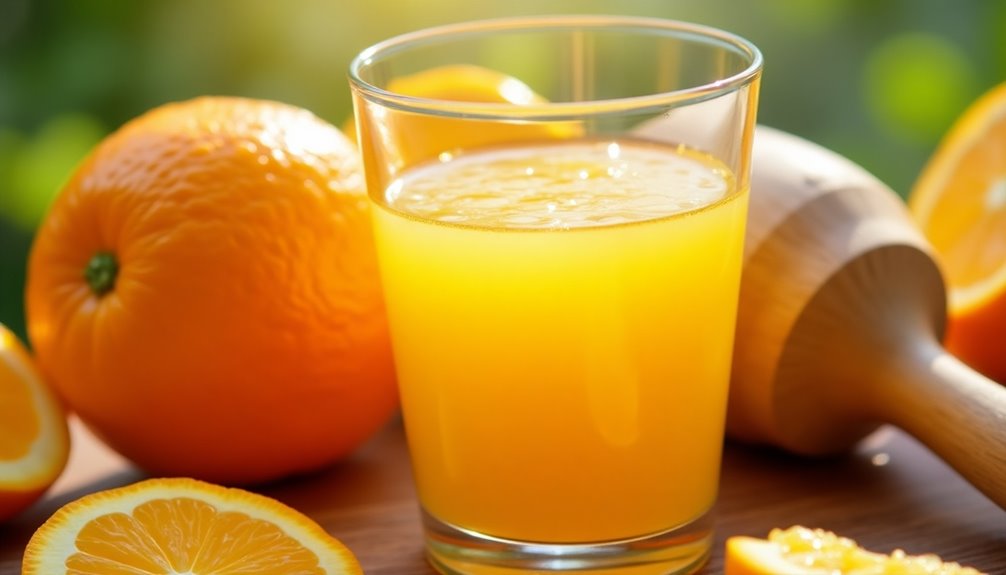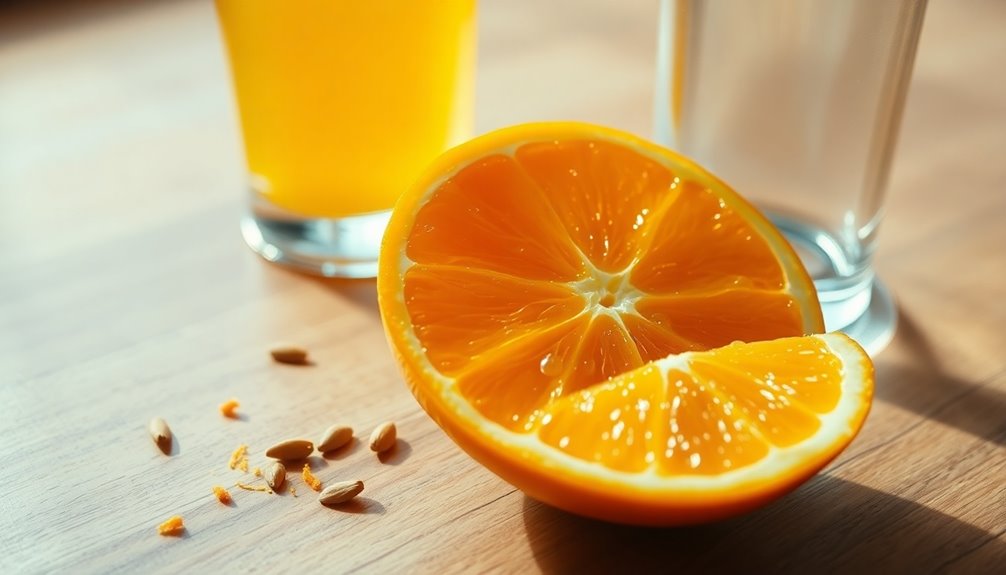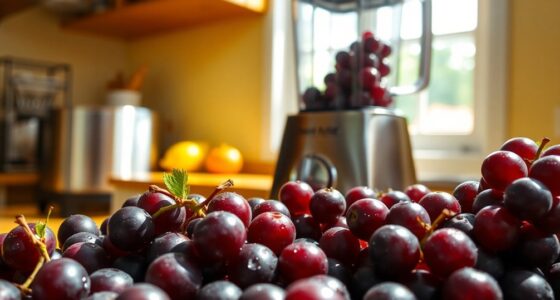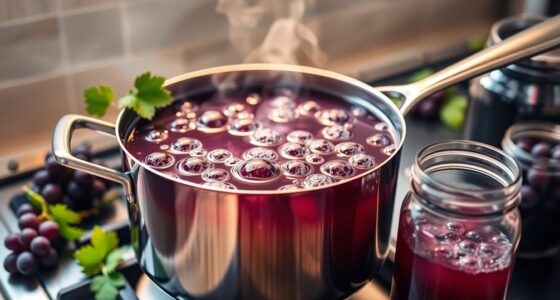A medium-sized orange typically produces about 4 to 5 tablespoons of juice, which equals roughly 2 to 3 ounces. The actual juice yield can depend on the orange's size and ripeness, so larger, riper oranges tend to give more. If you're planning to make a delicious drink, you'll need about three to four oranges for an 8-ounce cup. Stick around to uncover some handy tips for maximizing your juice extraction and using those peels!
Key Takeaways
- A medium-sized orange typically yields about 2 to 3 ounces of juice.
- Juice yield can vary based on the size and ripeness of the orange.
- Generally, it takes 3 to 4 medium oranges to make an 8-ounce cup of juice.
- Warmer and riper oranges tend to produce more juice when juiced.
- For maximum juice extraction, consider warming and rolling the orange before cutting.

When you squeeze a medium-sized orange, you can expect to get about 4 to 5 tablespoons of juice, or roughly 2 to 3 ounces. This juice yield is a delightful surprise when you consider how much flavor and nutrition is packed into that single fruit.
If you're planning to whip up a refreshing glass of orange juice, you'll need to do a little math. To fill an 8-ounce cup, you'll require about three to four medium-sized oranges. This calculation can help you plan your juicing sessions, ensuring you've got enough fruit to quench your thirst.
The amount of juice you extract can vary significantly based on the size and ripeness of the oranges. Larger and riper oranges typically yield more juice than their smaller, less ripe counterparts. So, when you choose your oranges, consider going for the plumpest ones you can find. Navel and Valencia oranges are particularly renowned for their juiciness, making them fantastic choices for juicing. If you want to maximize your juice yield, stick to these varieties.
Before you start juicing, there are some handy techniques you can employ to improve your results. Warming the orange in the microwave for just 10 to 15 seconds can help break down the fruit's cell walls, allowing more juice to flow out.
Additionally, rolling the orange on the countertop before cutting it can help to loosen the juice inside, making your juicing process even more effective. These simple tricks can significantly enhance the amount of juice you get, so don't skip them.
The juicing process itself can be a fun and rewarding experience. As you slice into a fresh orange, the vibrant color and fragrant aroma will invigorate your senses. When you squeeze the orange, you'll feel the juice splattering and see it collecting in your chosen container.
Each medium-sized orange can add a burst of flavor to your drink, and when you combine multiple oranges, you'll create a refreshing beverage that's both delicious and nutritious.
Remember to save the leftover orange peels; they can be used to enhance flavor in various dishes or even in homemade cleaning solutions. So, as you enjoy your fresh juice, you're not just savoring the taste but also making the most of your oranges.
Next time you think about how much juice one orange makes, keep in mind that while it may only be 2 to 3 ounces per medium-sized orange, those tablespoons of juice can create a delightful blend when combined with others.
Whether you're enjoying it on its own or using it in cocktails or smoothies, fresh orange juice from Navel and Valencia oranges is a treat that's hard to resist. So grab those oranges and start juicing!
Frequently Asked Questions
How Much Orange Juice Is Equal to 2 Oranges?
When you juice two medium-sized oranges, you can expect to get about 8 to 10 tablespoons of juice, which is roughly 4 to 6 ounces.
This amount is perfect for a refreshing drink or to enhance your favorite recipes.
Keep in mind that the exact yield can vary depending on the oranges' size and ripeness, so you might want to adjust based on your preferences and the specific oranges you choose.
How Many Ounces of Juice Are in 2 Oranges?
So you think two oranges will quench your thirst like a tropical oasis? Well, buckle up!
You're looking at about 4 to 6 ounces of juice from those two beauties. That's roughly 8 to 10 tablespoons of liquid sunshine, not enough for a full cup.
If you're planning a juice party, grab some more oranges! Remember, the juiciness can vary, so pick the plumpest ones for the best results.
Happy juicing!
How Many Oranges Make 2 Cups of Juice?
To make 2 cups of orange juice, you’ll need about 6 to 8 medium-sized oranges. Each orange yields roughly 4 to 5 tablespoons of juice, so you’ll want to have a few extra on hand in case some are less juicy. When selecting your oranges, look for ones that are slightly heavy for their size and have a smooth, blemish-free skin, as these are often juicier. You might be wondering how much juice in one orange, and it typically ranges between 2 to 4 tablespoons, depending on the variety and ripeness. If you prefer a sweeter taste, consider using Valencia or navel oranges, as they are known for their rich flavor and high juice content.
For the best flavor, choose ripe oranges, as they tend to provide more juice.
Enjoy your fresh juice; it's a delicious way to boost your vitamin C intake!
How Many Oranges Make 8 Oz Juice?
Imagine a thirsty traveler in a sun-soaked orchard, seeking refreshment. To quench that thirst with 8 ounces of orange juice, you'll need about three to four medium-sized oranges.
Each orange brings its own burst of flavor, contributing to the final blend. Remember, the juicier the orange, the more satisfying your drink will be.
Conclusion
In the grand symphony of flavors, one orange dances its way into a refreshing glass, yielding about a half-cup of vibrant juice. It's like capturing sunshine in liquid form, brightening your day with every sip. So, the next time you squeeze that citrus treasure, remember: it's not just juice; it's a burst of nature's energy. Embrace the zest of life and let that orange awaken your senses, one delicious drop at a time!
Cindy thoroughly researches juicing trends, techniques, and recipes to provide readers with practical advice and inspiration. Her writing style is accessible, engaging, and designed to make complex concepts easy to understand. Cindy’s dedication to promoting the advantages of juicing shines through her work, empowering readers to make positive changes in their lives through the simple act of juicing.
















